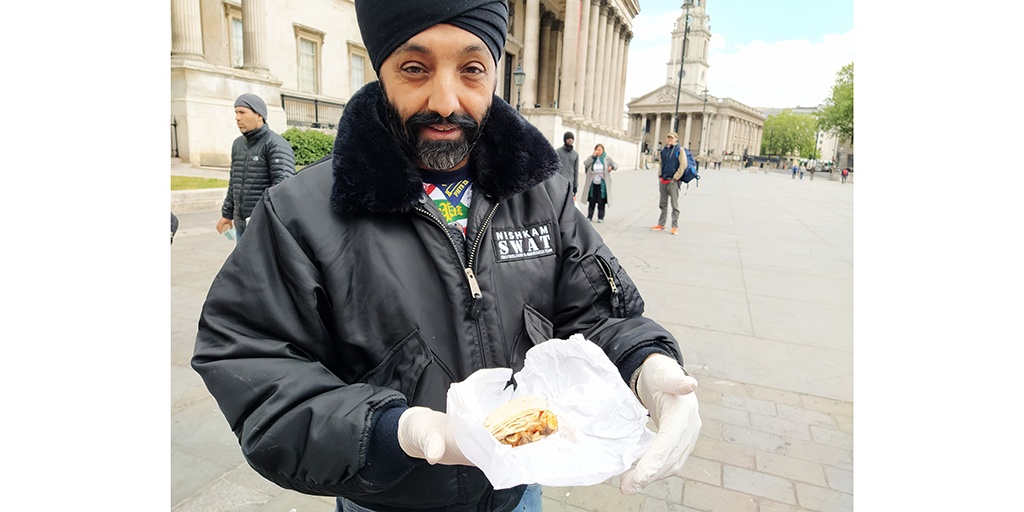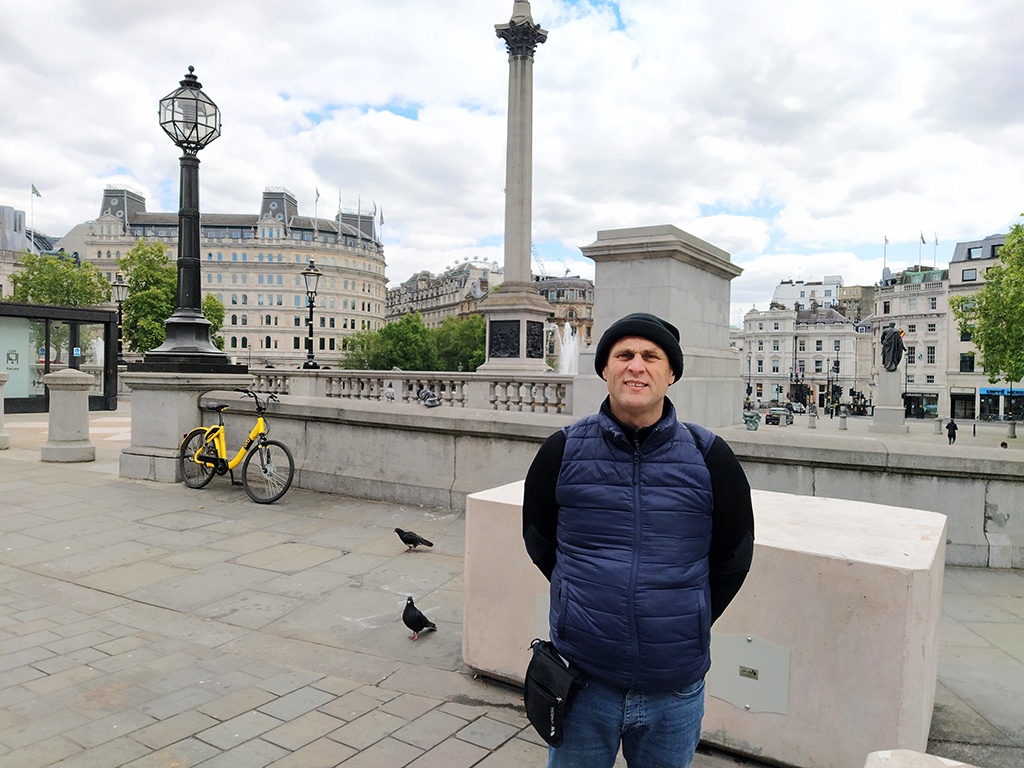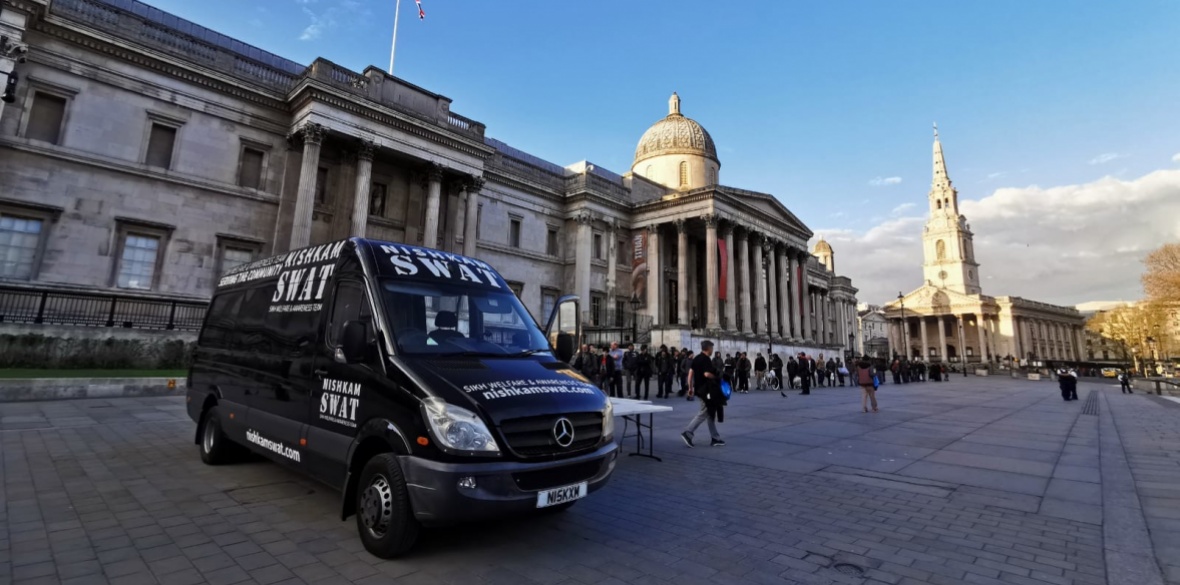This is the last article you can read this month
You can read more article this month
You can read more articles this month
Sorry your limit is up for this month
Reset on:
Please help support the Morning Star by subscribing here
IN TRAFALGAR Square, the steps rising up to Nelson’s column are eerily empty. The usual groups of tourists scrambling on top of the bronze lions are nowhere to be seen. But around the National Portrait gallery it’s a different story.
Here dozens of homeless people are lounging on the grass, chatting and smoking in the morning sun. They are all waiting for food and water — necessities which have become incredibly difficult to find in lockdown London.
As I made my journey to the centre of the capital to speak with volunteers providing food for the homeless, I was shocked to see people huddled in closed shop fronts and passed out on deserted pavements. (I even saw a man wrapped in a sleeping bag just metres away from Parliament itself).
“I expected a radical reduction in homeless people that we were going to be serving but I actually saw an increase of people on the streets,” Randeep Lall, the founder of Sikh charity NishkamSWAT, tells me.

The group, which has been feeding rough sleepers for 10 years, has continued to distribute food, drinks and clothes in Trafalgar Square from its black van six days a week throughout the lockdown.
In that time they’ve had to increase the number of meals a day from 180 to around 280.
Lall tells me that their services are needed now more than ever, since most day centres have closed during the pandemic while the numbers of rough sleepers remain high.
Within minutes of the volunteers arriving, a socially distanced queue had already stretched back towards the gallery with people waiting for water, smoothies, homemade wraps and cakes and teas and coffees.
The scene was a far cry from the messaging sent out by the government in recent weeks that almost everyone has been given a place to stay.
The Ministry of Housing, Communities and Local Governance (MHCLG) has repeatedly claimed that 90 per cent of known rough sleepers have been offered accommodation since the pandemic began.
But according to the Greater London Authority (GLA) there are still around 400 to 600 people sleeping rough in the capital each week, some of which are new homeless.
Other big cities such as Manchester and Birmingham have also reported high numbers of rough sleepers.
For groups working with rough sleepers throughout the lockdown, it became apparent quite quickly that not everyone was eligible for the government’s “Everyone In” scheme.
Entrenched homeless
On March 26 rough sleeping minister Luke Hall ordered councils to provide housing to all homeless within 48 hours to protect them and the public from Covid-19.
This demand was met with an unprecedented collective effort by charities, local authorities and the NHS to find accommodation, contract catering companies and provide health, social and addiction services.
Since then, 5,400 people nationally have been put up in a safe place to see through the crisis. The majority of those are in London where the GLA repurposed 14 hotels, currently housing around 1,300 rough sleepers. Hundreds have also been put up in other accommodation acquired by local councils.
Although this response has been remarkable in many ways, not everyone has been able to benefit from it.
Strict rules on smoking and leaving the premises deterred some people from wanting to stay in the hostels while others left.
Allan (not his real name), who has been sleeping rough for six years, tells me he preferred to stay on the streets.
“If they put you in a hotel, they can tell you that you can only go out for 20 minutes. If you’re on the street, they can’t tell you what to do, and they can’t fine you because you live there,” he says.
Other people were kicked out for breaking the rules and anti-social behaviour. The Guardian reported in April that 47 of the 200 rough sleepers put up in Manchester were evicted from their hostels.
Lall tells me he doesn’t think there’s been enough support for people with complex mental health needs and drug addictions.
“If you are going to put people in hotels and keep them off the street, then you need to put up everything else to support and look after them, otherwise they will be a threat to themselves more than ever.”
During the distribution I met Gheorghe, a Romanian rough sleeper who was asked to leave a hotel run by charity St Mungo’s in Westminster around one month ago. Since then he’s been sleeping on the streets.
“I was kicked out of the hotel in the middle of a pandemic,” he tells me. “I talked to my case worker but they said that there probably won’t be another space for me.”
Gheorghe said he was booted out after he complained about the food and got into an altercation with a council worker.
“I appreciate them putting us up in a hotel, but they didn’t have the proper expertise to communicate with the people,” he added.
St Mungo’s director of rough sleeping services Petra Salva explained that staff were “working very hard” to keep people inside the hostels to protect them from the virus.
“However, there may be some people, for a host of reasons, who are not able to meet the hotel safety or other requirements and in those situations are asked to leave,” she said.
St Mungo’s runs seven of the 14 GLA-procured hotels in London, as well as other homeless accommodation across the country.
But Janie Mac, the co-founder of Refugee Community Kitchen which has been providing food parcels and hot meals to the homeless in Brixton and Camden, argues there are “101 things that could have been done,” instead of the simple act of removing people.
“You can’t put someone that’s been living on the streets with mental health issues and drug issues and put them in a hotel room and expect them to co-operate. There are many layers on why that is difficult for them, including isolation.
“It’s easy to look after the people who are compliant, who do what they’re told, but the most vulnerable people are the ones who are the most difficult for many reasons. And if you haven’t sorted that out then you haven’t been successful.”
Destitute migrants
One of the biggest groups of people who’ve been out of the Everybody In scheme are homeless migrants.
Despite initially declaring that everyone would be eligible for the hotel scheme, the government has since told local councils that they will not cover housing for people with no recourse to public funds (NRPF).
This dreaded term prevents people with insecure immigration status from accessing public housing and benefits.
For cash-strapped councils, knowing that they will not be reimbursed, this has led to some continuing to use immigration rules to bar destitute migrants from the scheme.
Groups including Public Interest Law Centre (PILC), Migrant Rights Network and Project 17 have repeatedly called on the government to lift these rules and provide specific funding to house migrants.
However their demands have fallen on deaf ears. Unable to push for these changes at a national level, PILC has been fighting individual cases to put pressure on councils.
This has proved successful but, in some cases, only after the group threatened legal action, Benjamin Morgan, PILC’s homeless project coordinator tells me.
“In some areas responsibility for sourcing accommodation for people with NRPF is being passed back and forth between the housing office and the local homelessness outreach team — and, in London, between local authorities and the GLA,” he explains.
“It has often taken intervention from councillors or threats of legal action before people with NRPF are accommodated.”
Covid-19 mutual aid groups have also been fighting on behalf of destitute migrants.
Jonathan Moberly, a volunteer with Weavers Ward group in Tower Hamlets, successfully pressed the council to house a Bangladeshi man who had been sleeping rough in a park. He was illegally evicted during the lockdown after losing his job.
At first Moberly put him in touch with the council, believing the government’s message that all rough sleepers would be put up in hotels. But the council refused to provide accommodation because he had no recourse to public funds.
“I spent the whole of the next week harassing the council to get him housed, and it was a really difficult experience,” Moberly tells me.
The council closed his case twice, and even when he was given a place to stay, failed to send confirmation, meaning he was almost kicked out as soon as he arrived.
He was also asked to cover the £25 weekly service charge despite the fact he had no money, and was then not provided with food services.
Moberly tells me that each step was made “typically difficult” and he believes without his intervention, the man would still be sleeping in the park.
Moberly, who also supports a foodbank for people who are NRPF, said he was shocked that these communities had been left out of the new support provided by the government.
“When the lockdown happened the government was talking about all this wonderful new help it was providing for everyone — none of it was on offer to these people.”
Tower Hamlets said that it has removed barriers to accessing support “wherever we have been able to.”
“This includes accommodating people with no recourse to public funds, whose immigration status means they would not normally be eligible for council support,” a spokesperson said.
Since the outbreak, London councils have housed 900 people who are NRPF. However its likely that many of the people on the streets are those who’ve fallen victim once again to the Tories’ hostile environment.

New homeless
The latest worry by charities and grassroots groups is the influx of new homeless on the streets, and the dwindling funding available to house them.
“We’re getting new service users we haven’t seen before who are new on the streets and we’re only seeing that over the last week and a half,” Mac says.
“It’s that knock on effect of not being able to pay rent for one month.”
Earlier this week Manchester Mayor Andy Burnham accused the government of misleading councils over its Everyone In scheme as the funds promised do not cover the costs of putting up new homeless.
In March, Hall pledged an initial £3.2 million to councils followed by £3.2 billion. However this was expected to cover a variety of other costs including social care.
Burnham claims these sums were not sufficient and have left local authorities facing “unfunded costs” for putting up rough sleepers not known to them before the outbreak.
This has happened in the south London borough of Lambeth, which has spent an estimated £45m on its coronavirus response.
A spokesperson told me, however, that the government has agreed to cover less than half of this sum — meaning the council now has to foot the bill for 50 rough sleepers.
Councils are also desperate to acquire new temporary accommodation as existing space fills up, according to the Local Government Association.
Although new people are still being moved into GLA-procedures hotels in London, it’s only a matter of time before they too fill up. The GLA said over 90 per cent of its hotel beds are now taken.
What’s next?
Even more worrying for those already in hotels is the prospect of soon being turfed back out onto the streets.
A leak last week suggested that ministers are about to pull the plug on the Everyone In scheme.
“The question now is what happens next to this vulnerable group,” Salva from St Mungos says.
A lack of funding to be able to provide accommodation in the future is “troubling,” she says while rough sleepers in hotels are becoming more “anxious about their futures.”
MHCLG has vehemently denied it is pulling funding for the scheme but this has failed to reassure groups working with rough sleepers.
In Trafalgar Square, Adam admits he also decided not to go into a hotel because it would be too difficult to find himself back on the streets.
“Why do they want to get our hopes up just to chuck us out?” he asks.
“If they didn’t have houses one year ago, where are they going to get them now?”
As I walk home past more rough sleepers, I fear that he may be right.
Bethany Rielly is a Morning Star reporter. You can find her on Twitter via: @b_rielly.











